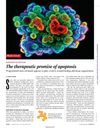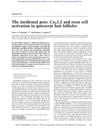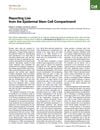 53 citations,
October 2012 in “The FASEB Journal”
53 citations,
October 2012 in “The FASEB Journal” Bimatoprost, a glaucoma medication, may also help treat hair loss.
[object Object]  42 citations,
July 2012 in “PLOS ONE”
42 citations,
July 2012 in “PLOS ONE” Estrogen can temporarily slow down hair growth but this can be reversed.
33 citations,
July 2007 in “Journal of cell science” Miz1 is essential for proper hair structure and growth.
 30 citations,
December 2018 in “International Journal of Biological Macromolecules”
30 citations,
December 2018 in “International Journal of Biological Macromolecules” Chitosan and surface-deacetylated chitin nanofibers may help treat hair loss.
30 citations,
February 2010 in “The journal of investigative dermatology/Journal of investigative dermatology” Plet-1 protein helps hair follicle cells move and stick to tissues.
 23 citations,
October 1988 in “Clinics in Dermatology”
23 citations,
October 1988 in “Clinics in Dermatology” Minoxidil was first made for high blood pressure, but it was later found to help hair growth.
20 citations,
February 2018 in “Cell transplantation” Cinnamomum osmophloeum leaf extract may help treat hair loss by promoting hair growth and increasing hair cell proliferation.
 19 citations,
June 2002 in “American Journal of Dermatopathology”
19 citations,
June 2002 in “American Journal of Dermatopathology” Apoptosis contributes to hair loss in androgenetic alopecia.
 16 citations,
October 2020 in “Lipids in Health and Disease”
16 citations,
October 2020 in “Lipids in Health and Disease” Leptin affects skin and hair health and may worsen some skin conditions, but more research is needed to understand its full impact.
[object Object]  13 citations,
June 2020 in “BMC genomics”
13 citations,
June 2020 in “BMC genomics” A specific microRNA, chi-miR-30b-5p, slows down the growth of hair-related cells by affecting the CaMKIIδ gene in cashmere goats.
 9 citations,
March 2019 in “Science”
9 citations,
March 2019 in “Science” Blocking cell death in certain stem cells can improve wound healing and tissue regeneration.
 9 citations,
January 2017 in “Food & Nutrition Research”
9 citations,
January 2017 in “Food & Nutrition Research” Rice bran mineral extract may help promote hair growth and prevent hair loss.
 7 citations,
January 2020 in “Scientific Reports”
7 citations,
January 2020 in “Scientific Reports” Rabbit skin analysis showed changes in hair growth and identified miRNAs that may regulate hair follicle development.
4 citations,
June 2021 in “Frontiers in Pharmacology” Bone marrow stem cells and their medium help hair regrowth.
3 citations,
January 2023 in “Agronomy” KDML105 bran extract may help with hair growth and prevent hair loss.
 3 citations,
March 2015 in “Biomolecules & Therapeutics”
3 citations,
March 2015 in “Biomolecules & Therapeutics” Phospholipids from pig lungs can significantly promote hair growth.
 3 citations,
June 2013 in “Genes & development”
3 citations,
June 2013 in “Genes & development” CaV1.2 helps activate hair follicle stem cells without calcium flux.
2 citations,
February 2024 in “Toxins” Bee venom can help stem cells promote hair growth.
 2 citations,
March 2023 in “Biomedicine & pharmacotherapy”
2 citations,
March 2023 in “Biomedicine & pharmacotherapy” Platelet lysate effectively promotes hair growth and improves hair thickness in people with androgenetic alopecia.
 2 citations,
August 2012 in “Cell Stem Cell”
2 citations,
August 2012 in “Cell Stem Cell” The study showed that some hair follicle stem cells wake up to grow hair while others stay asleep, and that the environment around them is important for hair growth.
 1 citations,
September 2022 in “The journal of investigative dermatology/Journal of investigative dermatology”
1 citations,
September 2022 in “The journal of investigative dermatology/Journal of investigative dermatology” MicroRNA-148a is crucial for maintaining healthy skin and hair growth by affecting stem cell functions.
 1 citations,
May 2017 in “InTech eBooks”
1 citations,
May 2017 in “InTech eBooks” Hair loss in Androgenetic alopecia (AGA) is due to altered cell sensitivity to hormones, not increased hormone levels. Hair growth periods shorten over time, causing hair to become thinner and shorter. This is linked to miscommunication between cell pathways in hair follicles. There's also a change in gene expression related to blood vessels and cell growth in balding hair follicles. The exact molecular causes of AGA are still unclear.
January 2025 in “British Journal of Dermatology” Long scalp hair evolved for cooling and social signaling.
November 2024 in “Biochemical and Biophysical Research Communications” Abnormal gene expression related to keratin causes hair loss in certain mice.
May 2024 in “Molecules/Molecules online/Molecules annual” Plant extracts can help prevent hair loss and promote hair growth.
 April 2024 in “Pharmaceuticals”
April 2024 in “Pharmaceuticals” Bimatoprost helps with hair growth and eye conditions but can be costly and have side effects.
 April 2024 in “Clinical, cosmetic and investigational dermatology”
April 2024 in “Clinical, cosmetic and investigational dermatology” Salvianolic Acid B helps hair grow by reducing cell stress and increasing blood flow to hair follicles.
 February 2024 in “ACS Omega”
February 2024 in “ACS Omega” The Shen Bai Hair Growing Decoction may help treat hair loss by promoting hair growth and reducing inflammation.
 January 2024 in “Journal of tissue engineering”
January 2024 in “Journal of tissue engineering” Sunlight exposure damages hair follicles, but certain stem cell-derived particles can reduce this damage and help with hair regeneration.
October 2023 in “Nutrients” Millet and wheat extracts may improve hair health and promote growth.




















